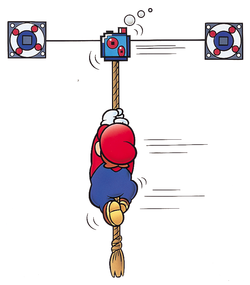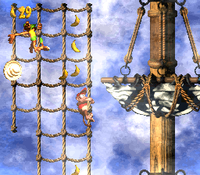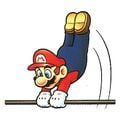Rope
It has been requested that this article be rewritten and expanded to include more information. Reason: determine Donkey Kong Junior object, add more appearances such as Wario Land: Shake It!, etc.
- This article is about the recurring objects in the Super Mario franchise. For the specter of the same name, see Rope (ghost).
| Rope | |
|---|---|
 Rope artwork for Super Mario World | |
| First appearance | Super Mario World (1990) |
| Latest appearance | Super Mario 3D All-Stars (2020) |
Ropes (also known as wires[1] or bars[2][3]) are recurring objects that appear in both the Super Mario franchise and the Donkey Kong franchise. There are two types of ropes: horizontal and vertical. A character can usually grab on to a rope. The horizontal ones allow them to climb across, while the latter ones allow them to climb up and down.
History
Super Mario series
Super Mario World
Ropes first appear as an interactive object in Super Mario World, where they are placed vertically and used similarly to vines. In the game, they are usually linked to a mechanism moving constantly left and right (or up and down), allowing Mario and Luigi to grab on to the rope and thus to cross pits, for example. When riding Yoshi, however, the player cannot grab the rope.
Super Mario Sunshine
In Super Mario Sunshine, ropes (also called Wire Ropes[4]) appear as somewhat common objects in various locations, and seem to be based off the ones in Donkey Kong for the Game Boy. As in that game, wires can be hung off and used to perform a Super Whirl Jump to reach higher places. Additionally, Mario can walk on them as if it were a tightrope. Jumping on top of them for a higher bounce is also possible. Wire Traps can be found on them.
Super Mario Advance 4: Super Mario Bros. 3
In Super Mario Advance 4: Super Mario Bros. 3, stationary ropes are prominently featured in the World-e level Rich with Ropes. They can be climbed similarly to vines, the difference being that they do not need to be activated and that Hoopsters (from Super Mario Bros. 2) are often found on them crawling up and down. A few ropes are also present in two other World-e levels, Ground Work and Bowser's Airship 2, though Hoopsters do not show up in these levels.
New Super Mario Bros. sub-series
Ropes also appear in the New Super Mario Bros. series, where their behavior has slightly changed. In New Super Mario Bros., they are mostly found on ceilings instead of tracks. When the player starts grabbing onto a rope, it starts swinging and the player can adjust its speed and movement by changing positions on the rope before jumping off. Exclusively found in World 6-B and a bonus area in World 7-1 are ropes that are on tracks, similar to Super Mario World. There are also vines that appear in jungle themed levels which serve the same purpose as ropes other than appearance.
In New Super Mario Bros. Wii and New Super Mario Bros. U, the ropes are replaced with chains, which serve the same purpose as ropes other than appearance. In New Super Mario Bros. 2 the ropes and vines now swing automatically and the player is unable to adjust their speed and movement. There are also ropes that hang horizontally on ceilings that the player can climb through to reach other areas.
New Super Mario Bros. and New Super Mario Bros. 2 also feature tightropes that can be walked across. In the former, it acts as a normal platform, although Mario moves slower on it. However, he can jump higher, similar to the ropes in Super Mario Sunshine. In New Super Mario Bros., tightropes only appear in the World 1-Castle. If Mario or Luigi stand still on one too long, they lose their balance and fall off if they do not move or jump in time. Sometimes as Shell Mario or Luigi, if they do a shell dash on it to reach the end point, it continues rolling after they let go from running or jump up high.
Super Mario 3D Land
Super Mario 3D Land features tightropes much like the ones in New Super Mario Bros., where they mainly appear in World 3-4, World 7-3, Special 3-3, and Special 7-1. Fuzzies appear on tightropes in this game, acting in a way comparable to Wire Traps.
Super Mario Odyssey
In Super Mario Odyssey, two New Donkers can be found swinging a rope around at the park near the Main Street Entrance in New Donk City. After jumping over it 30 times in succession, Mario will be rewarded with a Power Moon. He will get another Power Moon if he manages to jump over it 100 times.
Donkey Kong (Game Boy)
Ropes appear in Donkey Kong for the Game Boy in multiple configurations. Vertical ones tend to hang from above, and are interacted with much like the vine objects from Donkey Kong Jr.. Diagonal or horizontal ropes (also called Horizontal Bars[5]) are attached to telephone-like poles. Mario can grab on and move across ropes and can also do the Wire Spin to either do a small jump or a large jump to get to areas he could not reach.
Donkey Kong Country and Donkey Kong Land series
Donkey Kong Country
In Donkey Kong Country, there are only vertical ropes, which are either stationary or repeatedly swing back and forth like a vine, the latter of which is mainly used to travel across large gaps. Both the regular ropes and the swinging ropes first appear in the second level, Ropey Rampage, where Donkey Kong and Diddy Kong must use them to travel between treetops. In later levels, some vertical ropes only start to swing once the Kongs grab on to them. Swinging ropes constantly sway back and forth without a loss of momentum. When grabbing on to a swinging rope, the Kongs are moved down to the lower end, even if they grab the top. The Kongs cannot climb up a swinging rope, and in some cases have to jump from several of them, usually while avoiding enemies, in order to progress. In Forest Frenzy, there are long vertical ropes that slowly move across pits. None of the Animal Friends have the ability to hold on to a rope.
In Slipslide Ride, there are unique blue and purple ropes, which slide the Kongs up and down respectively. For both types, the player can hold the opposite directional button to stop the Kongs from slipping.
Donkey Kong Land
In Donkey Kong Land, some vertical ropes are contained within patches on the ground. If Donkey Kong or Diddy Kong break one of these patches, a vertical rope comes out and quickly begins to float upward. Either Kong must grab the rope to be taken to a Bonus Level, which occurs once the rope goes off-screen. Slippas also have a new behavior in which they slither up and down ropes.
The game introduces rigging levels, which have vertical and horizontal ropes that often intersect. In these levels, Donkey Kong or Diddy Kong must climb these ropes, along with standard vertical ropes, to progress through the level.
Donkey Kong Country 2: Diddy's Kong Quest / Donkey Kong Land 2
In Donkey Kong Country 2: Diddy's Kong Quest, horizontal ropes were introduced and climbable vertical ropes make a returning appearance. The rigging levels, consisting of intersecting ropes, also return from Donkey Kong Land. The vertical, horizontal, and intersecting ropes all make a first appearance in the second level, Mainbrace Mayhem.
Swinging ropes do not return, although two of the bramble levels, Bramble Scramble and Screech's Sprint, have swinging vines instead. In these levels, standard horizontal and vertical ropes in general have the appearance of vines. In the swamp levels, there are cattails, which Diddy and Dixie can grab and hold on like a vertical rope. In Castle Crush and Chain Link Chamber, chains take the appearance and role of ropes.
The game introduces Klingers, an enemy with an instinctive ability to climb ropes; they repeatedly climb up a rope, a chain, or a cattail before sliding down. Ghostly ropes are also introduced, and they appear throughout the level, Ghostly Grove. They are used like non-moving vertical ropes, but have a key difference of vanishing and reappearing every few seconds.
In Donkey Kong Land 2, ropes serve the same purpose as in Donkey Kong Country 2: Diddy's Kong Quest.
Donkey Kong Country 3: Dixie Kong's Double Trouble! / Donkey Kong Land III
In Donkey Kong Country 3: Dixie Kong's Double Trouble!, both the vertical and horizontal ropes return. The horizontal ropes have a different appearance in each setting.
The level Kong-Fused Cliffs features several vertical ropes that are lit by a small flame at the bottom. When Dixie and Kiddy touch one of these ropes, the flame begins to light up the rope, and the Kongs must quickly climb up the rope without touching the flame at the tip while avoiding incoming enemies. If the Kongs fall off one of these ropes, they lose a life. In Konveyor Rope Klash, there are ropes that move either left or right rapidly like a conveyor belt, although it is possible for Dixie and Kiddy to jump or move in the opposite direction.
The game introduces another enemy, Klasps, who wear a TNT Barrel and move across horizontal ropes. In many cases, Dixie and Kiddy must jump from several horizontal ropes while avoiding them.
In Donkey Kong Land III, ropes serve the same purpose as in Donkey Kong Country 3: Dixie Kong's Double Trouble!.
Donkey Kong Country Returns / Donkey Kong Country Returns 3D
 This section is a stub. You can help the Super Mario Wiki by expanding it.
This section is a stub. You can help the Super Mario Wiki by expanding it.
Ropes reappear in Donkey Kong Country Returns and Donkey Kong Country Returns 3D, where the player must hold down the "clutch" button for the Kongs to continue holding on the rope.
Donkey Kong Country: Tropical Freeze
 This section is a stub. You can help the Super Mario Wiki by expanding it.
This section is a stub. You can help the Super Mario Wiki by expanding it.
Ropes appear in Donkey Kong Country: Tropical Freeze and its Nintendo Switch port.
Mario Party series
In the Mario Party series, ropes are mainly found in minigames. In Hot Rope Jump, located in Mario Party and Mario Party 2, the players are supposed to jump over a rope made of Podoboos. In Get a Rope in Mario Party 5, the player's task is to choose one out of three ropes. Chump Rope in Mario Party 8 has a similar objective compared to Hot Rope Jump; however, it is a 1-vs.-3 minigame as opposed to a 4-player minigame. A jump-rope once again appears in Skipping Class in Mario Party 9.
Mario vs. Donkey Kong
Ropes reappear in Mario vs. Donkey Kong, where they behave in the exact the same way as they do in Donkey Kong for the Game Boy. In this game, the horizontal variants are known as wires.
Donkey Kong Jungle Beat
Four kinds of ropes appear in Donkey Kong Jungle Beat, with the most basic being a swinging type that commonly appears as vines.[6] Another type is a taut horizontal rope that bounces Donkey Kong when he jumps on it, another type acts similar to a zipline, and the final one is a vertically oriented one he slides down.
Profiles
Super Mario 3D Land
- European website bio: "Take your time and keep your balance - make sure you don't fall off!!"
Gallery
- For this subject's image gallery, see Gallery:Rope.
Donkey Kong (Game Boy) artwork
Super Mario 3D Land (E3 2011 screenshot)
Names in other languages
| Language | Name | Meaning | Notes |
|---|---|---|---|
| Japanese | ロープ Rōpu ワイヤー[7] Waiyā 掴みロープ[6] Tsukami Rōpu 滑りロープ[6] Suberi Rōpu 滑りロープ(垂直)[6] Suberi Rōpu (Suichoku) |
Rope Wire (horizontal, Mario vs. Donkey Kong) Grab Rope (bouncing, Donkey Kong Jungle Beat) Sliding Rope (zipline, Donkey Kong Jungle Beat) Sliding Rope (Vertical) (vertical, Donkey Kong Jungle Beat) |
|
| Chinese (simplified) | 绳索[13] Shéngsuǒ |
Rope | |
| Chinese (traditional) | 繩索[14] Shéngsuǒ |
Rope | |
| Dutch | Touw[?] | Rope | |
| German | Seile Stange[9] |
Rope Bar (horizontal, Mario vs. Donkey Kong) |
|
| Italian | Corda Parallela[12] |
Rope Parallel bar (horizontal, Mario vs. Donkey Kong) |
|
| Portuguese | Corda[?] | - | |
| Russian | Канат[?] Kanat |
Rope | |
| Spanish | Cuerda Barra[10] Cable[11] |
Rope Bar (horizontal, Mario vs. Donkey Kong) Wire (horizontal, Mario vs. Donkey Kong) |
References
- ^ Mario vs. Donkey Kong instruction booklet, page 25.
- ^ Mario vs. Donkey Kong Nintendo 3DS Virtual Console digital instruction manual, page 12.
- ^ Wario Land: Shake It! instruction booklet, page 4.
- ^ Hodgson, David S J, Bryan Stratton, and Stephen Stratton. Super Mario Sunshine Prima's Official Strategy Guide. Page 12.
- ^ "Swing from the Horizontal Bar, then press Up on the Control Pad and the Jump button." - The Super Game Boy Player's Guide, page 36.
- ^ a b c d Donkey Kong Jungle Beat Shogakukan book. Pages 12-13.
- ^ Mario vs. Donkey Kong Japanese instruction booklet, page 4.
- ^ Mario vs. Donkey Kong European instruction booklet, page 58.
- ^ Mario vs. Donkey Kong European instruction booklet, page 38.
- ^ Mario vs. Donkey Kong European instruction booklet, page 98.
- ^ Official Mario vs. Donkey Kong website (Guías Nintendo)
- ^ Mario vs. Donkey Kong European instruction booklet, page 118.
- ^ Official simplified Chinese website for Super Mario 3D Land. Retrieved April 5, 2020.
- ^ Official traditional Chinese website for Super Mario 3D Land. Retrieved April 5, 2020.
| Donkey Kong | |
|---|---|
| Characters | Donkey Kong • Mario • Pauline |
| Levels | 25m • 50m • 75m • 100m |
| Items and objects | Bolt • Conveyor Belt • Hammer • Ladder • Lift • Parasol, Hat & Bag |
| Enemies and obstacles | Barrel • Cement tub • Fire • Fireball • Jack • Oil drum |
| Other | 25m Theme • Gallery • Media • Opening • Staff |





